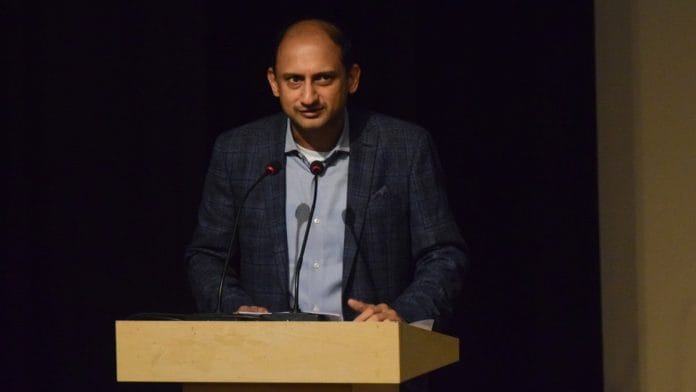New Delhi: Viral Acharya, the latest Reserve Bank of India (RBI) member to make an exit, made headlines last year when his remarks exposed the deep rift that existed between the central bank and the Modi government.
In a speech on RBI’s autonomy, then deputy governor Acharya had said, “Governments that do not respect central bank independence will sooner or later incur the wrath of financial markets, ignite economic fire, and come to rue the day they undermined an important regulatory institution.”
Acharya’s comments on the importance of independent regulatory institutions, delivered as part of a lecture on 26 October, were a flashpoint in the tussle between the RBI and the Modi government, with many senior ministers and civil servants criticising him privately.
Within a week, Subhash Chandra Garg, Secretary, Department of Economic Affairs in the finance ministry, tweeted about many positive macroeconomic indicators.
Rupee trading at less than 73 to a dollar, Brent crude below $73 a barrel, markets up by over 4% during the week and bond yields below 7.8%. Wrath of the markets?
— Subhash Chandra Garg (@Subhashgarg1960) November 2, 2018
Intense speculation followed on the fate of then RBI governor Urjit Patel and Acharya. Patel eventually resigned in December citing “personal reasons”.
Since then all eyes have been on Acharya’s next course of action.
On Monday, Business Standard reported that Acharya had quit, six months ahead of the end of his three-year tenure in December 2019.
In its statement issued after the report was published, RBI said, “A few weeks ago, Dr. Acharya submitted a letter to the RBI informing that due to unavoidable personal circumstances, he is unable to continue his term as a Deputy Governor of the RBI beyond July 23, 2019. Consequential action arising from his letter is under consideration of the Competent Authority.”
Persistent questions over RBI autonomy
Acharya, who is returning to Stern Business School of the New York University where he worked as professor prior to his RBI stint, was appointed in December 2016 by the Modi government.
The end of his term signals the exit of the last of the dissenting voices within the central bank.
The former deputy governor had been vocal in defending RBI’s stance and never shied away from delivering lectures on the most pressing issues that were a bone of contention between the central bank and the government.
Just weeks before his October 2018 speech on RBI’s autonomy, Acharya had also openly defended the prompt corrective action (PCA) framework followed by the RBI. He had advocated sticking to it at a time when the Modi government was pushing for relaxations to the stringent framework that put curbs on lending by banks.
“…without the PCA imposition, some banks would have incurred even higher losses and required even more of taxpayer money for recapitalisation. Imposition of PCA can thus be seen as first, stabilising the banks at risk, and then, undertaking the deeper bank reforms needed for long-term viability of the business model of these banks,” he had said in another of his lectures.
“It is important, therefore, that the PCA framework to deal with financially weak banks is persisted with. Any slackening of the approach in the midst of required course action is an all too familiar and ultimately harmful habit that we must eschew. Well begun is only half done, as they say!”
‘Some hesitation’
Under its new governor Shaktikanta Das, a former civil servant who was appointed last year following Patel’s resignation, the central bank eventually removed a few banks from this framework.
Interestingly, Acharya in his speech on RBI’s autonomy had also flagged how governments can weaken the central bank by appointing government or government-affiliated officials to key central bank positions, such as governor.
In the monetary policy committee (MPC) meetings after Das took over, Acharya voted twice against a rate cut — once in February 2019 and then again in April — at variance with his other colleagues, including the governor.
Acharya finally relented and voted for a rate cut in the June meeting of the MPC with “some hesitation”, but not before highlighting the risk of a fiscal slippage.
Also read: RBI to the rescue – Modi govt eyes bank’s Rs 9.6 trillion surplus to beat economy blues







The RBI has dutifully delivered three 25 basis points cuts this year, bringing the repo rate down to 5.25%. Not much gunpowder left. That is assuming that the economy has been floundering because real interest rates are too high. This at a time when there is a drought of liquidity. Inflation is benign, but that could change, the poor progress of the monsoon being a concern. There is little progress on resolving the problem of NPAs. NBFCs may not be directly the RBI’s remit, but it cannot be oblivious to a storm blowing the roof of the neighbour’s hut away. An aversion to talent, intellect, autonomy of thought, candour does not lead to good decision making.
Just a stray thought. Could there possibly have been a more brilliant “ lateral entrant “ to the government than Dr Viral Acharya …